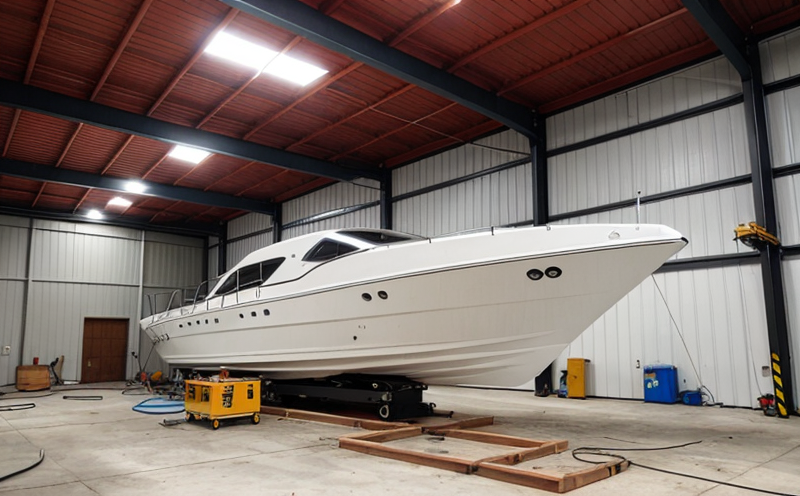ASTM D2485 Heat Resistance Testing of Marine Coatings
The ASTM D2485 heat resistance test is a critical procedure for ensuring the durability and longevity of marine coatings. This test evaluates how well a coating withstands exposure to high temperatures, which is essential given the harsh environmental conditions encountered by ships and offshore structures.
High-temperature environments can lead to degradation of protective coatings, reducing their ability to prevent corrosion and maintain structural integrity. By subjecting marine coatings to controlled heat stress according to ASTM D2485, manufacturers and quality assurance teams can ensure that coatings meet the required standards for long-term performance in marine settings.
This test is particularly important because it helps identify any weaknesses or vulnerabilities in a coating's chemical composition before they become critical issues on a vessel. The results of this testing are used to refine formulations, improve manufacturing processes, and enhance overall product quality.
The ASTM D2485 protocol involves placing a specimen of the coating under defined temperature conditions for a specified period. Afterward, the changes in the properties of the coating (such as adhesion, hardness, color retention) are assessed visually or using specialized equipment. This rigorous evaluation process ensures that only coatings capable of withstanding extreme temperatures are approved for use in marine environments.
Understanding the implications of ASTM D2485 on a broader level involves recognizing its role within the framework of global maritime standards. Compliance with such tests is not just beneficial; it's often mandated by regulations like ISO, EN, and IEC to ensure safety and reliability across international shipping operations.
The significance of this test extends beyond mere compliance—it directly impacts operational efficiency and cost-effectiveness. Ships equipped with coatings that pass ASTM D2485 are less likely to experience premature failure due to thermal stress, thus extending their service life. This can translate into significant savings in maintenance costs and reduced downtime for repairs.
Moreover, adherence to these tests fosters trust among stakeholders, including clients and regulatory bodies. It demonstrates a commitment to quality and safety, which is crucial for maintaining market credibility and ensuring compliance with international maritime standards.
Why It Matters
- Enhanced Durability: Ensures that marine coatings can withstand the rigors of high-temperature environments without compromising their protective capabilities.
- Better Product Quality: Identifies and rectifies any issues in coating formulations early on, leading to superior product performance.
- Increased Efficiency: By reducing the risk of premature failure due to thermal stress, this test helps maintain operational efficiency.
- Cost Savings: Reduced maintenance costs and fewer repairs translate into substantial savings for ship operators.
- Safety Assurance: Ensures that coatings meet stringent safety standards, contributing to the overall security of maritime operations.
- Environmental Impact Reduction: Longer-lasting coatings mean less frequent replacements, which in turn reduces waste and environmental impact.
- Compliance with Standards: Meeting ASTM D2485 requirements ensures compliance with international regulations, facilitating smoother global trade.
Benefits
- Improved Performance: ASTM D2485 testing guarantees that marine coatings perform optimally in challenging thermal conditions.
- Increased Reliability: By identifying potential weaknesses early, this test enhances the reliability of protective coatings.
- Sustained Integrity: Ensures that coatings maintain their structural integrity and resistance to corrosion under extreme temperatures.
- Cost Efficiency: Reduces maintenance costs and operational downtime by minimizing premature failures due to thermal stress.
- Enhanced Safety: The use of certified coatings improves the safety profile of maritime operations, reducing risks associated with material degradation.
- Sustainable Practices: By extending the lifecycle of coatings, this test supports more sustainable manufacturing and operational practices.
- Market Credibility: Compliance with ASTM D2485 standards enhances a company's reputation and market standing.
Quality and Reliability Assurance
The ASTM D2485 heat resistance test is integral to quality control processes in the marine coatings industry. It serves as a benchmark for ensuring that products meet stringent international standards, thereby enhancing reliability and trustworthiness.
During testing, samples are subjected to controlled temperature conditions to simulate real-world scenarios where coatings might be exposed to extreme temperatures. This includes both static and dynamic thermal cycling tests, which provide comprehensive insights into how the coating behaves under different thermal stress levels.
The apparatus used in ASTM D2485 is designed specifically for this purpose, featuring precise control over temperature parameters and exposure times. Once testing is complete, detailed reports are generated, detailing observed changes in physical properties such as adhesion strength, flexibility, and color stability. These reports serve as critical documentation that can be referenced during quality audits and regulatory reviews.
Compliance with ASTM D2485 is not just a formality; it represents a commitment to excellence in product development and manufacturing practices. It ensures that only the most reliable and durable coatings are used in marine environments, contributing significantly to overall maritime safety and efficiency.





